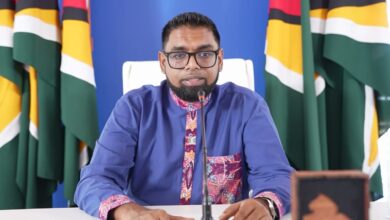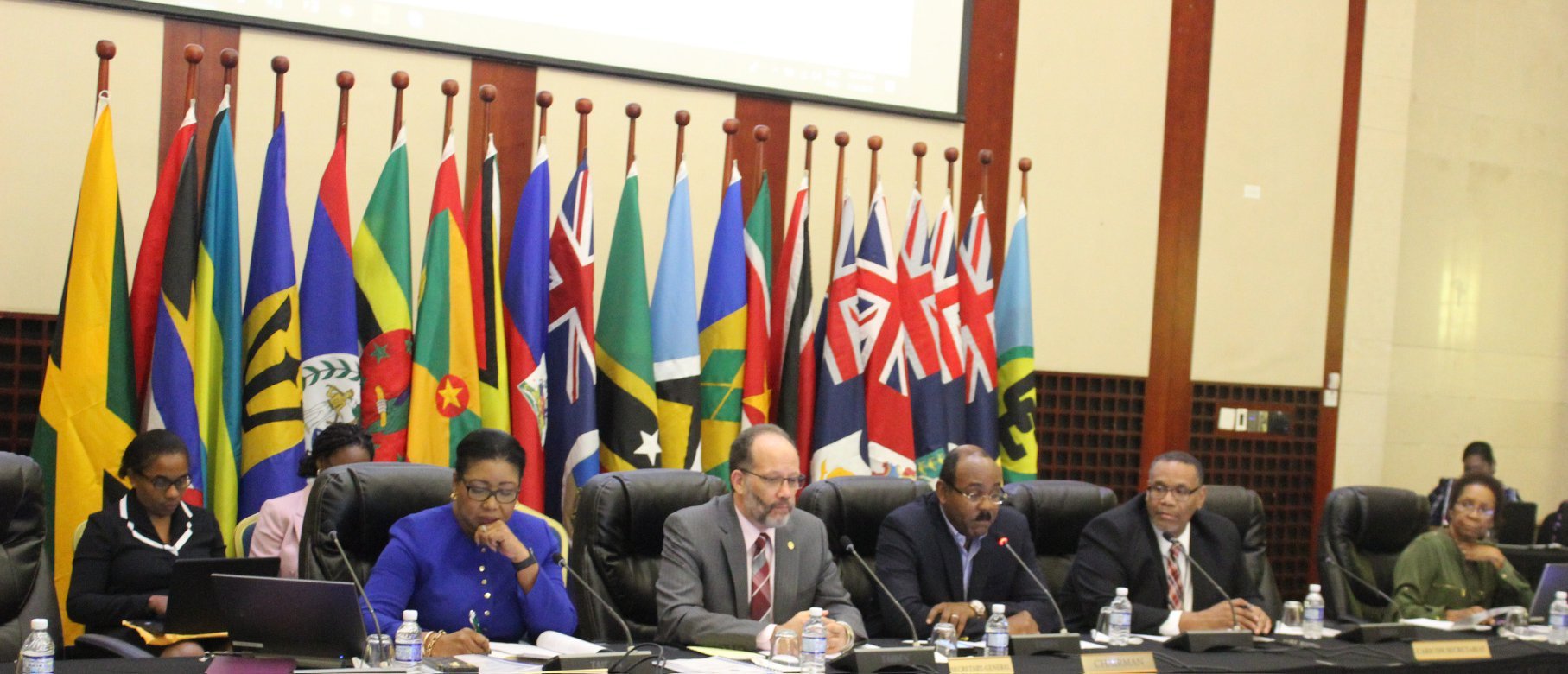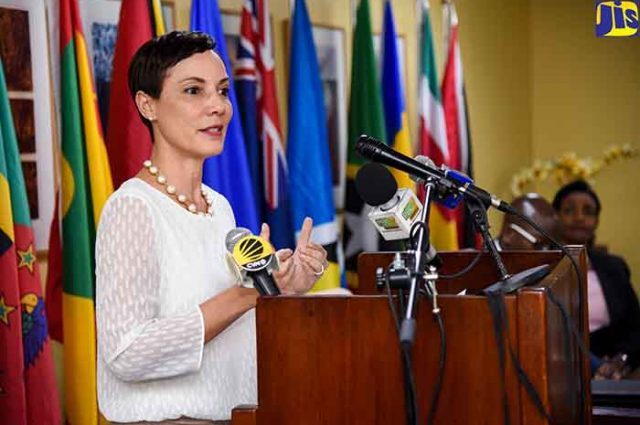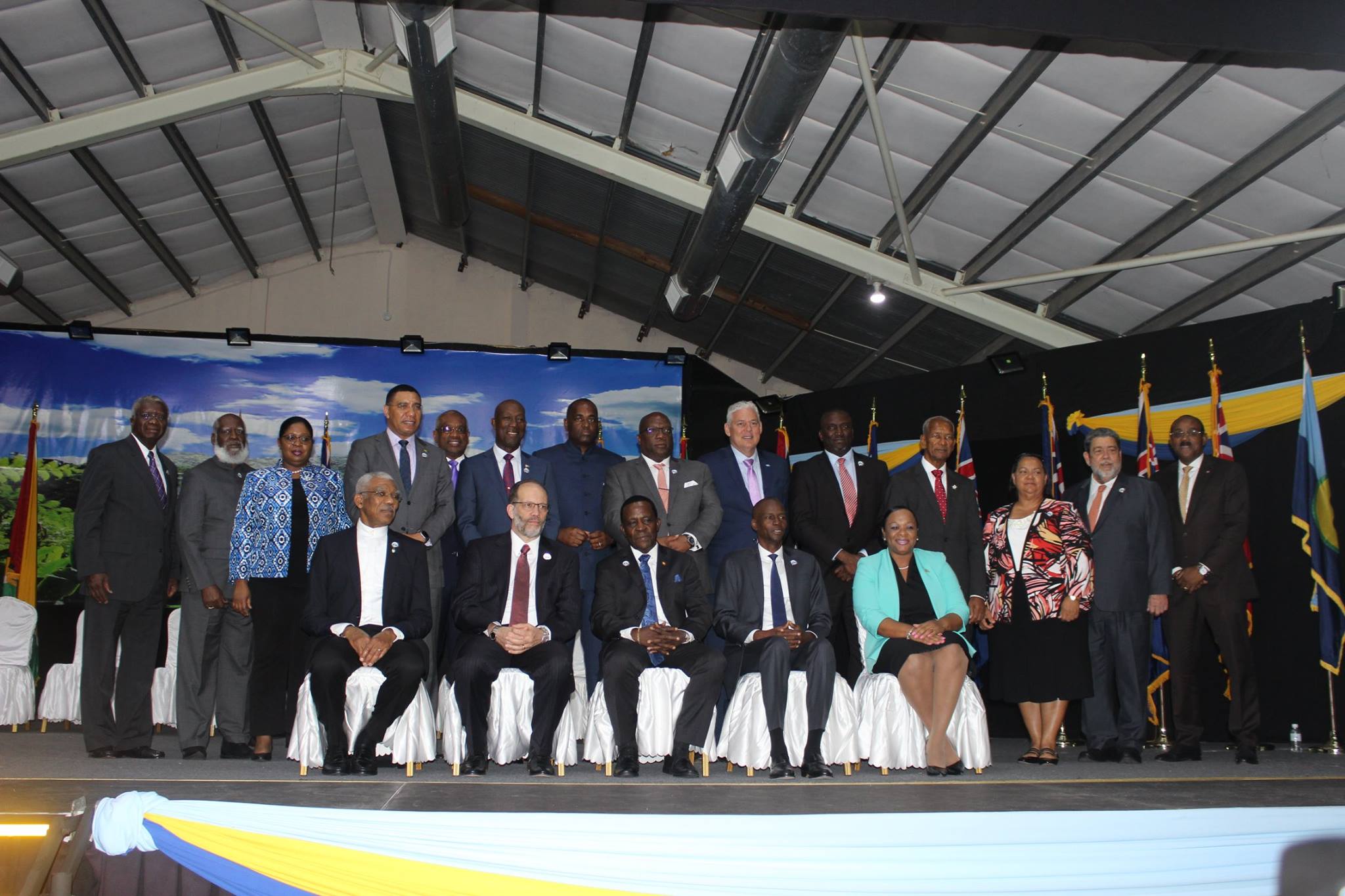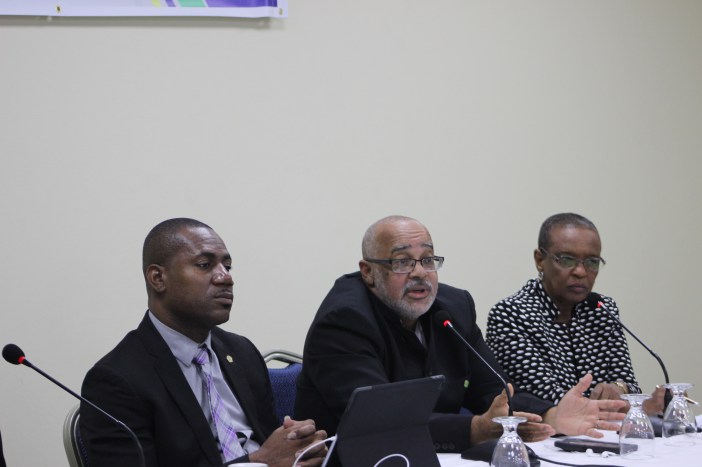(CARICOM Secretariat, Turkeyen, Greater Georgetown, Guyana) The Twenty-Fourth Inter-Sessional Meeting of the Conference of Heads of Government of the Caribbean Community (CARICOM) was held in Port-au-Prince, Republic of Haiti, from 18-19 February 2013. His Excellency, Michel Joseph Martelly, President of the Republic of Haiti, presided.
Other Members of the Conference in attendance were: the Prime Minister of Antigua and Barbuda, Honourable Winston Baldwin Spencer; the Prime Minister of The Bahamas, Rt. Hon. Perry G. Christie; the President of the Republic of Guyana, His Excellency Donald Ramotar; the Premier of Montserrat, Honourable Reuben Meade; the Prime Minister of the Federation of St. Kitts and Nevis, Rt. Hon. Dr. Denzil L. Douglas; the Prime Minister of Saint Lucia, Dr. the Hon. Kenny D. Anthony; the Prime Minister of St. Vincent and the Grenadines, Dr. the Hon. Ralph E. Gonsalves; and the Prime Minister of the Republic of Trinidad and Tobago, Honourable Kamla Persad-Bissessar.
Dominica was represented by Honourable Colin McIntrye, Minister of Employment, Trade, Industry and Diaspora Affairs; Jamaica was represented by Honourable Arnold J. Nicholson, Minister of Foreign Affairs and Foreign Trade; Suriname was represented by Honourable Gin-Mardo Kromosoeto, Minister of Regional Development, Land and Forestry Management; Barbados was represented by Mr. Charles Burnett, Permanent Secretary, Ministry of Foreign Affairs and Foreign Trade; Belize was represented by Ambassador Alexis Rosado, Chief Executive Officer, Ministry of Foreign Affairs.
Associate Member in attendance was the Premier, Turks and Caicos Islands, Honourable Dr. Rufus Ewing.
Special Guest in attendance was the Attorney-General of the United States of America, Honourable Eric Holder Jr.
OPENING SESSION
The Opening Session was addressed by the Chairman of the Conference of Heads of Government of the Caribbean Community, His Excellency Michel Joseph Martelly, President of the Republic of Haiti; Outgoing Chairman of the Conference, Dr. the Hon. Kenny D. Anthony, Prime Minister of Saint Lucia; and the Secretary-General of the Caribbean Community, Ambassador Irwin LaRocque.
Secretary-General LaRocque noted the historic nature of the Meeting being the first held in Haiti.
In his statement, he stressed the importance of change in the operations of the Community as it moves forward after 40 years.
“The circumstances which fashioned our approach to integration have changed, the nature of the challenges which we face has changed, our society has changed. Therefore, so must we. As we go forward to the next 40 years, in accepting that the imperative for integration of our small states is undeniable, we also have to accept that we must change our modes of operation if we are to deliver to our people the standard of living they desire,” the Secretary-General said
Prime Minister Anthony called for focus on the economic situation of the Region. “We need a “big conversation” about the future of our economies, not just the future of CARICOM. For that reason, I hope we can, at our Summit in July, focus on the future of our economies” he said.
The Prime Minister pointed to the need for all-round reform. “The problems that we face may well lie in the structure and underpinnings of the Institutions of the Community which were created by the Revised Treaty of Chaguaramas. Reforming the Secretariat may not yield the results that we seek. We have to take a hard look at the Institutions which we created,” he noted.
President Martelly stressed the need for interaction among the people of the Community. “The creation of the Community is primarily aimed at putting in contact and gathering Women and Men in the Caribbean around common values and a common goal. While being aware of certain limitations, our integration process will only reach the harmony necessary for its completion when our fellow citizens learn to know and appreciate each other and have the opportunity to work together,” he argued. In this regard, he underlined the importance of improving transportation to facilitate the movement of persons as well as of goods.
His Excellency urged his colleague Heads that there must be an intensified battle against crime in the Region, which challenged its sustainable development. “We must strengthen our cooperation in order to defeat these criminal networks that too often manage to open breaches in our security, to threaten whole swathes of our economic systems and cause social and political upheavals”, he said.
The Chairman of CARICOM told the Region that his goal in the coming months was to provide “the leadership of the integration process, with the grandeur and prestige required, with a view to leaving the legacy of a strengthened, united and even more dynamic Caribbean Community.”
He also emphasised that diversity was a strength of the Community and in this regard highlighted the need to valorise the languages of the Community.
STRENGTHENING THE REGIONAL CRIME AND SECURITY AGENDA AND ARCHITECTURE
Given the importance of crime and security to the Region and its effects on national and regional development, the Conference of Heads of Government convened a special caucus to focus on this issue, focusing on both law enforcement and prevention issues.
A significant feature of the Caucus was the engagement of Heads of Government with the Attorney-General of the United States of America, Mr. Eric Holder Jr. The Session began with a presentation from the Lead Head for Crime and Security in the CARICOM Quasi Cabinet, Prime Minister of Trinidad and Tobago, Honourable Kamla Persad-Bissessar, who focussed on the importance of regional and international cooperation in fighting trans-national organized crime, the importance of assessing the effectiveness of current frameworks in addressing the issues and the need for implementation of an agreed Crime and Security Strategy.
The US Attorney-General reiterated the interest of the US in focused engagement of the Region on Crime and Security. His presentation acknowledged that the Caribbean was being used as a transit corridor for illicit drugs and the accompanying proliferation of small arms. Heads of Government reiterated their call for the US to stem the illicit flow of small arms into the Region.
The Conference expressed appreciation to the US for the considerable resources made available through the Caribbean Basin Security Initiative (CBSI) and the continued technical assistance in areas such as judicial system strengthening and reform.
Both sides agreed that there was more that could be done to strengthen cooperation and reiterated that citizen safety and security should be recognised as a fundamental human right and treated with the urgency it deserved. It was noted in particular, that US Domestic policy on deportees and its negative consequences for the Region was a continuing area of concern.
Among the measures proposed were increased intelligence and information sharing, including with regard to arrangements related to deportation, and capacity building for law enforcement and crime prevention. It was recognised that one demonstrated positive instance of cooperation with the US was in the area of extradition, where the return of criminals to the US for trial had resulted in a significant reduction in serious crime in requested States
The Conference adopted a Regional Crime and Security Strategy which addresses many of the issues of Member States and which provides a common platform from which the Region could advance their fight against issues such as illicit trafficking, gang and youth violence, terrorism, cyber security while simultaneously addressing the issue of crime prevention.
A mandate was given to the CARICOM Implementation Agency for Crime and Security (IMPACS) to provide advice to Member States in the domain of crime and security such as gang violence and related prevalence of armed murders.
The Conference received the report of the Landell Mills Consultants on the Review of the Regional Security Institutions of CARICOM Member States and agreed to the continued operations of IMPACS, recognising its importance in the coordination of regional security efforts. The Conference agreed that there must be encouraged close cooperation between IMPACS and other entities, such as the Regional Security System (RSS) Caribbean Aviation Safety and Security Oversight System (CASSOS) and the Caribbean Disaster Emergency Management Agency (CDEMA).
The Conference took the opportunity to confirm the appointment of Mr. Francis Forbes as Executive Director, CARICOM IMPACS. Mr. Forbes has been the Agency’s Interim Executive Director since 1 June 2011.
THE ARMS TRADE TREATY
Heads of Government expressed grave concern over the unregulated trade in conventional weapons, including small arms and light weapons and their ammunition, which has exacted an unbearable toll on the security and the well-being of our citizenry, and the development of our States.
They reaffirmed that an Arms Trade Treaty was necessary to close those loopholes which allow the diversion of weapons from the legal trade to the illicit market through the adoption of commonly agreed global standards, which would be backed up by a legally binding set of rules. In keeping with the Declaration on Small Arms and Light Weapons which was adopted in St. Kitts and Nevis in 2011, the Caribbean Community will remain actively engaged in the reconvened negotiations at the Final United Nations Conference on an Arms Trade Treaty in March of this year, with a view to ensuring that the international community adopts tangible and effective measures to regulate the trade in conventional weapons.
The Community will to continue to work with like-minded states of the global community as well as members of civil society in order to make the Arms Trade Treaty a reality. The well-being of our people and the development of our States depend on it.
REFORM PROCESS IN CARICOM
The Conference welcomed the commencement of the Change Process in the Community with the presence of the Change Facilitation team to support the Secretary-General as he leads the change process.
In considering the draft Outline of the five-year Community Strategic Plan (2014-2019), the Conference recognised that a critical element of the Strategic Plan would be discussion and agreement within the Community on the priorities for the Community over the five-year period of the Plan. To this end a series of national consultations will be conducted.
Heads of Government agreed to designate a “Change Driver” at the level of a senior official in Member States with key deliverables of coordinating and facilitating the change process at the national level, in the first instance, and then as facilitators of change following the adoption of the Strategic Plan.
REPORT ON THE REGIONAL ARCHITECTURE FOR FINANCIAL STABILITY
The Conference received the report on the initiatives taken by the Committee of Central Bank Governors to develop a framework for financial risk assessment in the Region as well as a Regional Crisis Management Plan and welcomed the progress now being made.
The Conference noted the work being done by the Central Banks and other regulatory bodies on the preparation of national and regional financial stability reports inclusive of a risk contagion matrix to identify potential risks in the regional financial system and called upon Ministers of Finance and the Central Bank Governors to move swiftly to complete their deliberations so that the Risk Management Plan could be put into effect.
BRITISH AMERICAN INSURANCE COMPANY/COLONIAL LIFE INSURANCE COMPANY (BAICO/CLICO)
The Conference welcomed the progress made in the Eastern Caribbean Currency Union (ECCU) and Suriname regarding the resolution of the obligations to policyholders following the financial difficulties of British American Insurance Company and other CLICO subsidiaries.
The Conference noted that formulating a regional solution to address the liabilities of CLICO International Life Insurance was still a work-in-progress and urged the Technical Team overseeing the process to complete its proposals at the earliest opportunity. The Conference was, however, mindful of the importance of establishing a reformed supervisory and regulatory framework for financial institutions which operate cross-border in the regional financial space and welcomed the steps being taken by the ECCU in this regard.
THE OECS ECONOMIC UNION IN THE CONTEXT OF THE REVISED TREATY OF CHAGUARAMAS
The Conference agreed that the Inter-Governmental Task Force (IGTF) revising the Treaty of Chaguaramas would recognise the provisions of the Treaty establishing the Economic Union of the Organisation of Eastern Caribbean States (OECS).
The IGTF was mandated to refer back to the Conference at its next meeting on this issue.
MATTERS RELATED TO TRANSPORTATION IN THE REGION
The Conference expressed the firm view that transportation be a high priority on the Community’s agenda and mandated that a Special Meeting of the Council for Trade and Economic Development (COTED) be convened specifically to consider the key issues.
The recommendations of that meeting are to be brought to Conference at its next meeting in July in Trinidad and Tobago at which a session would be devoted to the issue.
CARICOM REGIONAL AID-FOR-TRADE STRATEGY
The Conference endorsed the Regional Aid-for-Trade Strategy which is regarded as a critical tool for mobilizing resources needed for the Region to enhance its competitiveness in the international market place. Preparation of the Strategy, which was supported by the Inter-American Development Bank (IDB), was the subject of consultations across the Caribbean Community including with representatives of civil society.
The goals of the Strategy are upgrading key economic infrastructure; enhancing competitiveness and facilitating trade expansion and diversification; and deepening regional integration and maximizing gains from external trade agreements. To achieve these goals, priority attention will be given to transformational projects in Maritime Transport, Information and Communication Technologies (ICT) and Energy.
The Conference agreed the Strategy would be formally launched under the auspices of the Chairman of the Conference and looked forward to the participation of the President of the Inter-American Development Bank (IDB), the Director General of the World Trade Organization (WTO), other development partners and institutions.
REGION’S PREPARATIONS FOR THE UNITED STATES FOREIGN ACCOUNT TAX COMPLIANCE ACT (FATCA)
The Conference was apprised of the status of preparedness of regional financial institutions for the application of FATCA. The Task Force established to advise on compliance was mandated to further review the national legislation of Member States in light of the fact that FATCA requirements were contrary to fundamental principles contained in existing legislation.
The Conference noted the challenges in terms of capacity and financial resources involved with moving towards compliance with the ACT and recognised that there was need for both technical and financial assistance.
INTRODUCING INTERPRETATION SERVICES FOR MEETINGS OF THE CONFERENCE
At the Thirty-Second Regular Meeting of the Conference of Heads of Government, President Martelly had put forward the request that French be adopted as one of the official and working languages of the Community. Heads of Government had mandated the CARICOM Secretariat to conduct a study on the implications of introducing interpretation and translation services for meetings of the Organs of the Community.
Based on that mandate, an assessment was commissioned by the Secretariat which provided an estimate of the budgetary implications of such a measure.
Heads of Government agreed to introduce French interpretation at meetings of the Conference.
WTO GAMING CASE BETWEEN THE GOVERNMENTS OF ANTIGUA AND BARBUDA AND THE UNITED STATES OF AMERICA
The Conference welcomed the update provided by the Honourable Prime Minister of Antigua and Barbuda on the trade dispute at the World Trade Organization (WTO) between his country and the United States on the question of internet gaming and the recent authorization from the WTO Dispute Settlement Body to suspend concessions and other obligations between Antigua and Barbuda and the United States under the Trade-Related Aspects of Intellectual Property Rights (TRIPS) Agreement relating to copyrights, patents, trademarks and related rights.
The Conference issued the following statement:
The Caribbean Community (CARICOM) affirms its full support for Antigua and Barbuda in its fight to obtain United States of America compliance with the ruling of the World Trade Organization (WTO) Dispute Settlement Body on the subject of cross-border provision of gambling and betting services.
The Conference of Heads of Government calls on the US to settle the dispute with Antigua and Barbuda by honoring its obligations to respect international rules and by complying with the decision of the WTO in this matter. Those rules apply to all countries whether small, large, rich or poor. All countries must abide by their obligations within the Community of Nations in the WTO.
The Community has stood with the US and the Community of Nations to defend the imperative of full compliance with internationally accepted norms and rules. However, in this case, the US must review its actions in the context of the principles referred to above.
Moreover, as small developing Nation States, we have consistently worked for international cooperation and reaffirmed that all sovereign Member States should be regarded as equals, and respected accordingly. In the current WTO dispute between Antigua and Barbuda and the US, we expect the US will fulfill its international obligations and engage Antigua and Barbuda in urgent, meaningful and constructive negotiations to arrive at a mutually acceptable settlement.
CARICOM is concerned over the extended delay in the resolution of this matter and urged US’s full compliance.
IMPROVING FOOD SAFETY AND TRACEABILITY
The Conference welcomed the project submitted by the Republic of Haiti to facilitate the electronic traceability system which would improve CARICOM countries capacities to cope with the challenges posed by the international export market as well as the value chain.
The Conference requested additional information on the project. Given the importance of the matter, the Governments of Haiti and Guyana undertook to hold further bilateral discussions on the matter.
MOVEMENT OF PERSONS WITHIN THE COMMUNITY
The Conference acknowledged that while significant strides had been made in the forty-year history of CARICOM in respect of trade in goods, there was still much to be done with respect to movement of CARICOM nationals within the Community. Free movement of persons is a key element of a single market and should remain a strategic priority for the Community to develop as it goes forward.
TURKS AND CAICOS ISLANDS
The Conference received with interest the address made by the Premier of the Turks and Caicos Islands. It was the first meeting of the Community at which the Turks and Caicos Islands had been officially represented by a democratically elected Government since the suspension of its constitution in August 2009, and a three-year period of direct rule by the United Kingdom Government.
The Conference noted with grave concern that, though the elections of November 2012 had led to the restoration of representative government, the overall state of political affairs remained less than desirable and the restoration of true democracy was still a far way off. The 2011 constitution, concieved in London and thrust upon the people of the Turks and Caicos Islands when they were without representation, was viewed as a mere by-law for the continuance of direct rule under the pretext of representative democracy.
Of additional concern were the challenges emanating from the workings of the justice system in relation to the criminal investigations that followed the commission of enquiry, and what was portrayed as “constant infractions of democratic principles and insults to the ideals of elected government”.
The Conference noted the reaffirmation of the Turks and Caicos Islands Government's commitment to the Caribbean Community as well as the expressed appreciation for the pronouncements of the Community on the situation in TCI. It was decided to continue to keep the situation under close review and to raise concerns with representatives of the British Government.
CARIFESTA XI, 16-25 August 2013
The Conference received with great interest, an update on preparations for CARIFESTA XI to be held in Suriname during 16-25 August 2013. Member States agreed to work closely with Suriname in preparation for the Festival and to participate actively.
BORDER ISSUES:
Belize – Guatemala
The Conference received an update on arrangements being made by Belize and Guatemala to hold simultaneous referenda on 6 October 2013, which is being preceded by a public awareness campaign, in respect of the decision on whether to submit Guatemala's claim to the International Court of Justice (ICJ) for a final and binding settlement.
The Conference expressed its full support for the process to bring Guatemala's claims to an end and called on the international community to also do so, especially in relation to meeting the costs involved in bringing this longstanding dispute for final determination.
The Conference is encouraged that both Belize and Guatemala are remaining faithful to the roadmap that both countries have agreed to in accordance with the Special Agreement of December 2008, and expressed its concern at any attempts to destabilize that process and its roadmap.
The Conference reaffirmed the Community’s firm and unequivocal support for Belize's sovereignty and territorial integrity.
Guyana-Venezuela
The Conference expressed its satisfaction that Guyana and Venezuela continued to enjoy excellent relations and were engaged in several activities aimed at increasing the level of cooperation between the two countries.
The Conference noted that Guyana and Venezuela remained committed to the Good Offices Process of the United Nations Secretary-General to aid them in the search for a solution to the controversy that arose from the Venezuelan contention that the Arbitral Award of 1899, that definitively delimited the territory between Guyana and Venezuela, is null and void.
The Conference reaffirmed the Community’s unequivocal support for the maintenance and safeguarding of Guyana’s sovereignty and territorial integrity.
SMALL ISLAND DEVELOPING STATES
The Conference welcomed the offer of Jamaica to host the Regional Meeting of the Conference of Small Island Developing States (SIDS) in Jamaica during 5-7 June 2013 as apart of the preparatory process for the Third SIDS Summit in Samoa in 2014.
UNITED NATIONS SECURITY COUNCIL
The Conference recalled CARICOM’s longstanding activism in the negotiations to reform the United Nations Security Council, and COFCOR’s May 2011 endorsement of a CARICOM position paper that called for expansion in both categories of membership, improved working methods, respect for the legitimate interests enshrined in the consensus African position, and provision of dedicated, non-permanent representation for Small Island Developing States (SIDS). In light of recent global developments, the Conference called for greater urgency in achieving lasting Security Council Reform within the previously endorsed parameters.
CARICOM-US SUMMIT
Heads of Government endorsed the proposal of the Chairman, His Excellency Michel Martelly to work, through the Representatives of Haiti in Washington, in consultation with all CARICOM Ambassadors accredited to the U.S., on the feasibility of holding a CARICOM-United States of America Summit during the next 12 months.
DATE OF THE THIRTY-FOURTH REGULAR MEETING OF THE CONFERENCE
The Conference agreed to the dates of 4-6 July 2012 for the convening of its Thirty-Fourth Regular Meeting to be held in Trinidad and Tobago under the Chairmanship of the Prime Minister of the Republic of Trinidad and Tobago, Honourable Kamla Persad-Bissessar.
The Twenty-Fourth Inter-Sessional Meeting of the Conference Heads of Government agreed to issue the following statement
Incident with International Media representatives
The Heads of State and Government of the Caribbean Community (CARICOM) received a report from the Prime Minister of St. Vincent and the Grenadines on the manner in which he was reportedly accosted and tackled on an aircraft, and physically impeded by a team of individuals purporting to be members of the British media. At the time of the incident, Prime Minister Gonsalves, his wife, and Ambassador Ellsworth John were on a LIAT airline en route to the Twenty-Fourth Inter-Sessional Meeting of Heads and State and Government of the Caribbean Community (CARICOM).
The Heads of Government expressed their grave concern with the manner in which Prime Minister Gonsalves, a sitting CARICOM Head of Government, was reportedly confronted.
While fully supportive of the freedom of the press and the vital role played by a free, active and responsible press in governance and development, the Heads of Government emphasised that the dignity of the office of Head of State or Government within CARICOM is equal to that of any other nation, as are the attendant security concerns and expectations. This dignity and security concern of a Head of Government cannot be violated by unidentified representatives of a foreign press service who, for whatever reason, expect a level of access to CARICOM Heads of State or Government that they would not receive from Heads of State and Government in their countries of origin.
The Heads of Government reiterated their individual willingness to be accessible to the media and responsive and forthcoming to reasonable requests from the press. They recommitted to the values of transparency, good governance and the free flow of information, which undergird the free and independent societies of CARICOM.


